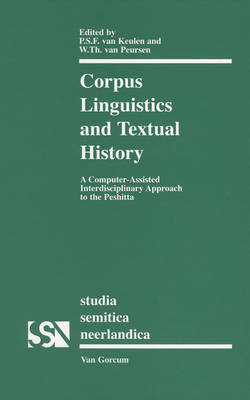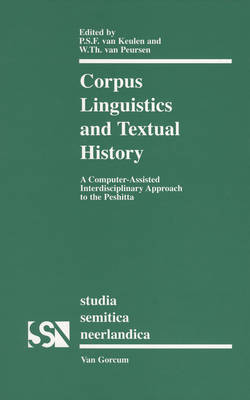
- Afhalen na 1 uur in een winkel met voorraad
- Gratis thuislevering in België vanaf € 30
- Ruim aanbod met 7 miljoen producten
- Afhalen na 1 uur in een winkel met voorraad
- Gratis thuislevering in België vanaf € 30
- Ruim aanbod met 7 miljoen producten
Zoeken
Corpus Linguistics and Textual History
A Computer-Assisted Interdisciplinary Approach to the Peshitta
Percy Van Keulen, Willem Th Van Peursen
€ 305,45
+ 610 punten
Omschrijving
Over the years the use of computers for research has become increasingly important in Biblical Studies. However, a combination of computational linguistics with diachronic text-critical and text-historical approaches has hardly ever taken place. Quite often, there is mutual misunderstanding between computational linguistics and more traditional approaches in the field of linguistics and textual analysis. For example, in computer-assisted research of modern text corpora it is common to treat the text as an unequivocal and unidimensional sequence of characters. In Biblical Studies, however, either text is considered an abstraction, the result of a scholarly reconstruction based on the extant textual witnesses. Here a fundamental difference in approach reveals itself.
The present volume tries to overcome the misunderstanding between the various disciplines and to establish how a fruitful interaction of information technology, linguistics and textual criticism, can contribute to the analysis of ancient texts. It addresses questions concerning the confrontation between synchronic and diachronic approaches, the role of linguistic analysis in the interpretation of texts, and the interaction of linguistic theory and the analysis of linguistic data.
The first section of this volume contains the papers presented at the CALAP seminar 2003. In the second section different aspects of the interdisciplinary analysis are applied to a selected passage from the Peshitta of Kings.
The present volume tries to overcome the misunderstanding between the various disciplines and to establish how a fruitful interaction of information technology, linguistics and textual criticism, can contribute to the analysis of ancient texts. It addresses questions concerning the confrontation between synchronic and diachronic approaches, the role of linguistic analysis in the interpretation of texts, and the interaction of linguistic theory and the analysis of linguistic data.
The first section of this volume contains the papers presented at the CALAP seminar 2003. In the second section different aspects of the interdisciplinary analysis are applied to a selected passage from the Peshitta of Kings.
Specificaties
Betrokkenen
- Auteur(s):
- Uitgeverij:
Inhoud
- Aantal bladzijden:
- 380
- Taal:
- Engels
- Reeks:
- Reeksnummer:
- nr. 48
Eigenschappen
- Productcode (EAN):
- 9789023241942
- Verschijningsdatum:
- 1/01/2006
- Uitvoering:
- Hardcover
- Formaat:
- Genaaid
- Gewicht:
- 799 g

Alleen bij Standaard Boekhandel
+ 610 punten op je klantenkaart van Standaard Boekhandel
Beoordelingen
We publiceren alleen reviews die voldoen aan de voorwaarden voor reviews. Bekijk onze voorwaarden voor reviews.








